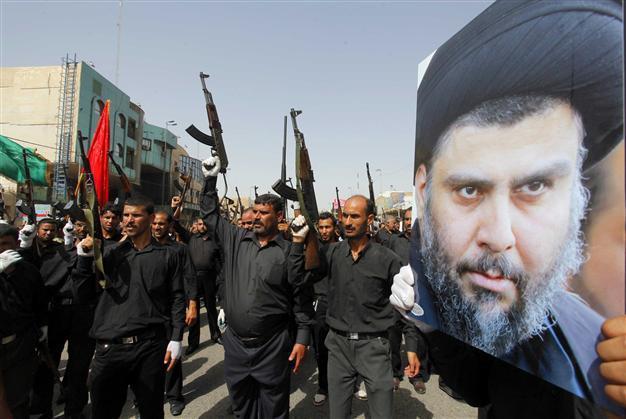Iraq's Sadr vows to 'shake the ground' against militants
BAGHDAD - Agence France-Presse

Mehdi Army fighters loyal to Shi'ite cleric Moqtada al-Sadr march during a parade in Najaf, June 21. REUTERS Photo
Powerful Shiite cleric Moqtada al-Sadr has vowed to "shake the ground" under the feet of advancing Sunni militants, as Iraqi prime minister Nuri al-Maliki warned rivals against exploiting the crisis to sideline him.Sadr, whose movement long battled U.S. forces during Washington's nearly nine-year war in Iraq, also voiced opposition June 25 to American military advisers meeting with Iraqi commanders.
Iraq is combatting an offensive by the jihadist group the Islamic State of Iraq and the Levant (ISIL) that has overrun swathes of five provinces, killed nearly 1,100 people, displaced hundreds of thousands and threatens to tear the country apart.,
U.S. President Barack Obama has so far refrained from carrying out air strikes on the insurgents, as urged by Maliki, but American military advisers began meeting Iraqi commanders June, with Washington having offered up to 300.
Sadr's remarks came as security forces continued to repel assaults on critical towns and infrastructure, though ISIL's offensive was bolstered when fighters from Al-Qaeda's Syrian franchise made a local alliance with it.
"We will shake the ground under the feet of ignorance and extremism," Sadr said in a televised speech from the Shiite holy city of Najaf.
He added that he was only in favour of "providing international support from non-occupying states for the army of Iraq."
The cleric's remarks came days after fighters loyal to him paraded with weapons in the Sadr City area of north Baghdad, vowing to fight the militant offensive.
raq's flagging security forces were swept aside by the initial jihadist push, but have since at least somewhat recovered - and while Sadr's Mahdi Army militia remains officially inactive, fighters loyal to the cleric have nevertheless vowed to combat the militant advance.
Reshuffle
The cleric demanded "new faces" in a national unity government following April 30 elections that saw incumbent prime minister Maliki emerge with by far the most seats, albeit short of a majority.
Washington has pressed for Iraq's fractious political leaders to unite in a national emergency government, and on Wednesday brushed off Maliki's insistence that such a move would be a "coup against the constitution and the political process."
Sunni tribal leaders have also called for a government to be formed which ignores the April election results, which they describe as a sham. However, Iraqi leaders have shown little sign of coming together.
U.S. officials said they believed that Maliki was still committed to opening a process on piecing together a government on July 1. "I think there's just been a little confusion about what he (Maliki) was ruling out here," said State Department deputy spokeswoman Marie Harf.
Washington has stopped short of calling for Maliki to go, but has left little doubt it feels he has squandered the opportunity to rebuild Iraq since American troops withdrew in 2011.
In a sign the Iraqi military has performed better in recent days, loyalists fought off insurgent attacks June 25on a major air base and a key western town, after repelling assaults on Iraq's biggest oil refinery.
Militants and security forces clashed periodically overnight, but government troops maintained control of the Balad air base, while another offensive was repelled in Haditha in Anbar province, west of Baghdad.
But the country was nevertheless hit by militant violence, with bombings and shelling south of Baghdad and in the disputed, ethnically-mixed northern oil hub of Kirkuk killing a total of 20 people.
Maliki's security spokesman has meanwhile said hundreds of soldiers have been killed since the offensive began.
The United Nations says at least 1,075 people have been killed in Iraq between June 5 and 22, and has tripled its appeal for aid funding to more than $312 million.The U.N. food agency has warned that the country faces "serious food security concerns."
















